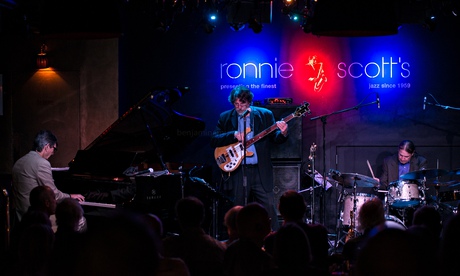
Last week was a good one for the Brubeck brand – if such a sophisticated collection of achievements can stand such a tawdry tag. Three of the late composer’s jazz-performing sons – pianist Darius, bassist Chris and drummer Dan – sold out four nights at Ronnie Scott’s, and Chris Brubeck also premiered his through-composed Travels in Time for Three, and a new orchestral arrangement of his dad’s famous Blue Rondo à la Turk, at the Proms on Tuesday. Dave Brubeck’s ability to mobilise the heart, the head and the booty made him a household name – and if his offspring don’t quite catch the pin-sharp purposefulness of the classic 50s Brubeck quartet, they’re old hands at celebrating the vision, and engaging creators of original music too.
The brothers were joined by the UK’s adroit Dave O’Higgins on sax, introduced by bandleader Darius as “the honorary Brubeck”. It’s a Raggy Waltz retained its catchy piano hook and clever tempo-shifts, but acquired a laconically soulful quality from O’Higgins’s more Coltrane-esque tenor sound, and a crisp, hard-boppish fluency in Darius’s piano break. O’Higgins was nimble on soprano sax in the skippy descents of The Duke, and slithery and microtonal (like the late Brubeck sax maestro Paul Desmond on the original) in bridging European and Turkish music on the impressionistic The Golden Horn, from 1958’s Jazz Impressions of Eurasia. Darius’s Cathy’s Summer merged waltzing tranquillity and glimpses of salsa, while a headlong, South African-inspired vehicle for Chris’s bass and Dan’s sleek, soft-textured drumming confirmed the group’s openness to world music.
But a highlight was the little-known 1954 song Audrey – a bewitchingly misty blues-ballad originally improvised in the studio while Brubeck and Desmond imagined Audrey Hepburn “walking through the woods”. O’Higgins must have been dreaming of a 21st-century equivalent in his lovely tenor solo, full of sighing high-register wonderment and purring low tones.

